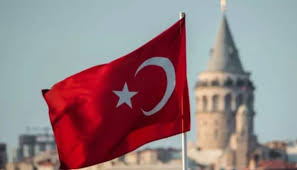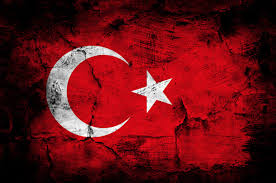
Turkey Sanctions
The situation in international relations with Turkey can change drastically, and new sanction measures often present businesses with complex challenges. At present, it is unknown to what extent sanctions against Turkey will be introduced. If the U.S. implements its plans, these will be the first economic restrictions against a NATO member. The value of the Turkish lira will also suffer significantly from the threat of sanctions being imposed.
Don’t know how sanctions might affect your business in Turkey? Our legal company will help you navigate the complex requirements of sanction legislation, minimize risks, and ensure full compliance. We will provide qualified consultations, conduct an audit of your operations, and develop a protection strategy. Don’t let sanctions disrupt your plans—contact our lawyers and receive professional legal support!

What are the Sanctions on Turkey?
Turkey is one of the key states in the Middle East and Eastern Mediterranean, playing an important geopolitical role both in the region and on the international stage. However, in recent years, the state has repeatedly become the target of sanctions.

Sanctions are a tool of foreign policy used by states and international organizations to exert pressure on certain entities in order to change their behavior or policy. Regarding Turkey sanctions may include:
- Economic restrictions: a ban on the export and import of goods and services, restriction of access to international financial markets and credit resources;Economic restrictions: a ban on the export and import of goods and services, restriction of access to international financial markets and credit resources;
- Financial measures: freezing of assets of companies and banks in the jurisdiction of the sanction-imposing party, blocking accounts of certain individuals or organizations;
- Personal sanctions: a ban on entry or issuance of visas to officials and businessmen, freezing of assets of specific individuals included in the sanctions lists;
- Trade restrictions: embargo or partial bans on the supply of high-tech equipment and materials, licensing, and prohibition of access to technologies and software.
One of the most compelling reasons for imposing sanctions is Turkey’s actions in areas of regional conflicts (for example, in Syria or Libya). Some countries and supranational organizations believe that Turkey undermines regional stability by supporting certain armed groups or conducting military operations not coordinated with the international community.
Contentious issues regarding the exploration and extraction of gas off the coasts of Cyprus and Greece are becoming the reason for the introduction of restrictive measures, especially from the European Union.
Turkey’s purchase of S-400 air defense systems from Russia caused a negative reaction from the United States. American legislation CAATSA provides for sanctions against partners who acquire major weaponry from countries previously subjected to restrictions.
Some Western countries point to the growing authoritarianism of the Turkish leadership, the persecution of political opponents, journalists, and activists, which raises criticism in the field of human rights and serves as a reason for certain restrictive measures.
For companies operating in the region or collaborating with Turkish partners, sanctions mean the need to closely monitor the dynamics of restrictive measures and comply with a set of compliance rules. Failure to adhere to sanction legislation may result in transaction blocks, fines, reputational losses, direct or indirect impacts on supply chains, termination of partnership agreements, and difficulties with financial operations.
US Sanctions on Turkey
Turkey has long been an important partner of the United States, including within the framework of the North Atlantic Alliance NATO. However, in recent years, relations between Ankara and Washington have become strained, leading to a series of restrictive measures from the U.S.
One of the key events that provoked sanctions was Turkey’s decision in 2017 to purchase S-400 surface-to-air missile systems from Russia. The first deliveries began in 2019, which caused a mixed reaction from Western allies.
In December 2020, the U.S. administration imposed sanctions against Turkey’s Defense Industry Directorate (SSB) and several of its executives under the Countering America’s Adversaries Through Sanctions Act — CAATSA. Later, depending on the development of events, the sanctions lists were reviewed and supplemented.
In addition to the purchase of the S-400, serious disagreements arose over a number of foreign policy issues, including Turkey’s role in regional conflicts (Syria, Libya, Eastern Mediterranean).
A number of Turkish organizations associated with the defense industry (including the Presidency of Defense Industries of Turkey, SSB) have come under sanctions. Deliveries and joint projects in the field of advanced military technologies are prohibited, as well as the transfer of technologies that the United States considers critically important for the defense sector.
Some restrictions apply to transactions in dollars and access to American loans for sanctioned entities. Individuals included in the sanctions lists face freezing of assets and a ban on conducting business in the jurisdiction of the USA.
Officials and heads of defense enterprises are prohibited from entering the USA. Their assets under US jurisdiction (if any) are frozen.
EU Sanctions on Turkey

Formally, the first notable decisions on the introduction of sanctions against Turkey began to be discussed in EU bodies in 2019. At that time, the European Union accused Ankara of illegal exploration and extraction of natural gas in the exclusive economic zones of EU member states (in particular, Cyprus).
During 2020 and 2021, sanctions were revised and supplemented several times. The EU Council made decisions to introduce personal measures (visa restrictions and asset freezes) against specific Turkish officials and companies associated with exploration activities in the Eastern Mediterranean.
Territorial disputes between Ankara and Athens and Nicosia, including over offshore gas fields and maritime borders, have repeatedly become the subject of heated discussions at EU summits. The violation of Cyprus and Greece’s maritime borders provoked a negative reaction from Brussels and served as a catalyst for the introduction of targeted restrictions.
So far, the EU has not imposed large-scale sectoral sanctions on the Turkish economy, as it has in the case of other countries. However, a number of statements indicate that in the event of conflict escalation, the introduction of stricter restrictions in energy, shipping, and other sectors may be considered.
UK Sanctions on Turkey
Before the official Brexit at the end of 2020, the United Kingdom participated in sanction initiatives within the framework of the European Union’s common foreign and security policy. Therefore, many of the early restrictive measures against Turkey were effectively applied in the territory of the United Kingdom as well.
After Brexit, London created its own independent UK Sanctions regime. Now the government of the United Kingdom independently develops and approves sanction measures, although in many cases they remain aligned or harmonized with the sanctions of the US, EU, and other allies.
In the context of the U.S. law CAATSA and similar measures against Russia’s partners, the United Kingdom has introduced targeted sanctions and restrictions on the supply of military technologies to Turkish companies associated with the acquisition or use of Russian military equipment.
The situation with human rights, the arrests of journalists, opposition members, and human rights defenders in Turkey has repeatedly been criticized in London. Positioning itself as a supporter of international legal norms and freedoms, the United Kingdom imposes targeted sanctions against individuals involved in such violations.
First and foremost, the sanctions are aimed at the financial sector and export control. This includes freezing assets and restricting access to the British financial market for Turkish companies and individuals included in the sanctions lists.
Possible restriction or suspension of cooperation in the oil and gas sector in case of Turkish companies involvement in controversial energy resource extraction projects in the Eastern Mediterranean. Tightened control over the conclusion of contracts for the supply of weapons and military technologies.
How Sanctions Affect Turkey
Pressure on the national currency. The increase in sanction risks and political disagreements with key partners leads to an outflow of foreign capital and a decline in the Turkish lira exchange rate. The devaluation of the lira affects the cost of imported goods, creating additional inflationary pressure on the economy.
Decline in investment attractiveness. Foreign companies view Turkey as a high-risk zone, avoiding long-term investments. The banking sector is becoming more cautious in financing deals involving Turkish partners due to the fear of secondary sanctions (especially from the USA).
Restrictions on financial transactions. Freezing of accounts and blocking access to foreign capital markets for specific companies and individuals.
Difficulty in export and import. Sectoral and export restrictions (especially on dual-use goods and military technologies) can hinder the development of several industrial sectors. The import of high-tech equipment or specialized components becomes more complicated.
Decline in competitiveness. Turkish exports face additional barriers in markets that impose sanctions or restrict access to their public procurement. The increase in costs for compliance with sanction legislation (legal checks, compliance procedures) falls on businesses, reducing their profitability.
Moreover, Ankara introduces reciprocal trade restrictions or raises tariffs on imports of goods from countries that have imposed sanctions. Political rhetoric about “external pressure” is often used by the Turkish leadership to strengthen domestic support, but at the same time, it leads to increased tensions with foreign partners.
Turkey sanctions screening
In light of the restrictive measures introduced against Turkey, any company conducting business in the region or having business ties with Turkish partners is required to carefully monitor compliance with sanctions legislation. Negligent attention to the verification of counterparties may lead to serious financial losses, asset freezes, and loss of business reputation.
Main steps during verification:
- Identification of beneficiaries. A detailed analysis of the ownership and management structure of the company, including ultimate beneficiaries, allows determining whether they are involved in sanctions violations;
- Scanning through sanction lists. Checking counterparties through databases, OFAC sanctions lists, as well as the lists of the EU, the United Kingdom, and other jurisdictions. It is important to consider possible names in different languages and old company names.
- Audit of connections and business geography. Some companies registered outside of Turkey may operate in sanctioned sectors, which increases risks. A comprehensive analysis of supply geography and partnership relations is necessary.
Our team of OFAC attorneys will conduct an in-depth review of all potential risks associated with Turkish counterparties. We assess the compliance of your activities with current sanctions law regulations and develop recommendations to minimize threats.
In long-term cooperation, we set up a system for continuous monitoring of changes in sanction lists and legislation. This will allow timely responses and adjustments to the business strategy.
Turkey Sanctions Attorneys
To avoid serious financial losses and legal problems, it is extremely important to consult qualified professionals in a timely manner. Lawyers of OFAC specializing in sanctions legislation.
We are convinced that protecting a business is not only about formal compliance with rules but also about maintaining business reputation and financial stability in the long term. That is why the expertise of lawyers who understand sanction mechanisms in the smallest details becomes a key factor for success.
Ready to take the first step toward reliable protection for your business? Contact our OFAC Turkey sanctions attorneys right now for an initial consultation and make sure that any sanction barriers can be overcome competently and safely.




